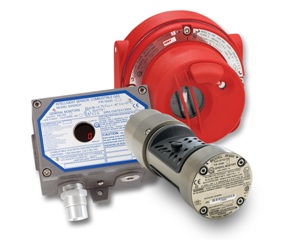Aug 1 2014
Operators at remote liquefied natural gas (LNG) production sites who rely on portable or skid mount vaporizer production equipment will find General Monitors provides comprehensive gas and flame monitoring to prevent accidental explosions and fires.
 IR400 Point IR Gas Detector
IR400 Point IR Gas Detector
Gas wells are typically drilled at remote sites. Often times it is a result of either the location of the gas, proximity to the public or a combination of both situations. Regardless, power is rarely available and prohibitively expensive to obtain. Drillers have found a way aroundthis obstacle by employing portable vaporizers and temporary Liquefied Natural Gas (LNG) sources.
LNG trucks are sent to potential drill sites along with portable vaporizers. After the connection is made, Compressed Natural Gas (CNG) is available to run a large power generator that is capable of providing power to the entire drill site. Once the site is producing gas and is self-sustainable, the LNG truck and vaporizer are moved to the next site.
Safety monitoring devices are always employed when LNG is being produced, used or stored due to its inherently explosive nature. LNG is stored at -260°F (-126°C) and as it is slowly warmed and vaporized it rapidly expands to 600 times its liquid volume. These harsh conditions are stressful on piping and valves which can result in potential leaks of combustible gas that endangers people, equipment and facilities.
To protect natural gas production sites, General Monitors offers a complete line of fixed hydrocarbon gas and flame detectors. The company’s advanced catalytic bead, infrared point, and ultraviolet/infrared (UV/IR) technologies provide highly reliable hydrocarbon hazard monitoring in rugged environments.
General Monitors’ S4000CH Combustible Gas Detector provides thorough, continuous monitoring of combustible gases via itsrobust catalytic bead technology. The unit features one person calibration and can virtually self-calibrate by simply activating a magnetic switch and applying gas. It is designed to monitor natural gas and vapors within the lower explosive limit (LEL) and provide status indication and alarm outputs. It complies with ANSI/ISA 12.13.01-2000 performance requirements for combustible gas detectors.
The IR400 Point IR Gas Detector uses infrared technology to sense for combustible gases and vapors to quickly and reliably detect LNG gas leaks. The detector comes factory pre-calibrated, has a three-second response time, takes only minutes to set-up, operates with less than 4.8 W of power, and is inexpensive to operate and maintain.
The FL3100H UV/IR Flame Detector monitors for both ultraviolet and infrared (UV and IR) spectral ranges and is highly immune to false alarms caused by radiation sources. Continuous Optical Path Monitoring (COPM) checks both optical path integrity and electronic circuitry once per minute; a wide field of view enables greater fire detection coverage. The flame detector's electronics are integral within its explosion-proof housing, allowing detector information to be processed at the point of detection.
About General Monitors
Founded in 1961, General Monitors is a global leader in process monitoring and safety in combustible, toxic and flammable environments. Whether the requirement is single-point gas and flame detection or a large multi-point integrated safety monitoring system, General Monitors provides the solution with a single-point of responsibility for total project management.